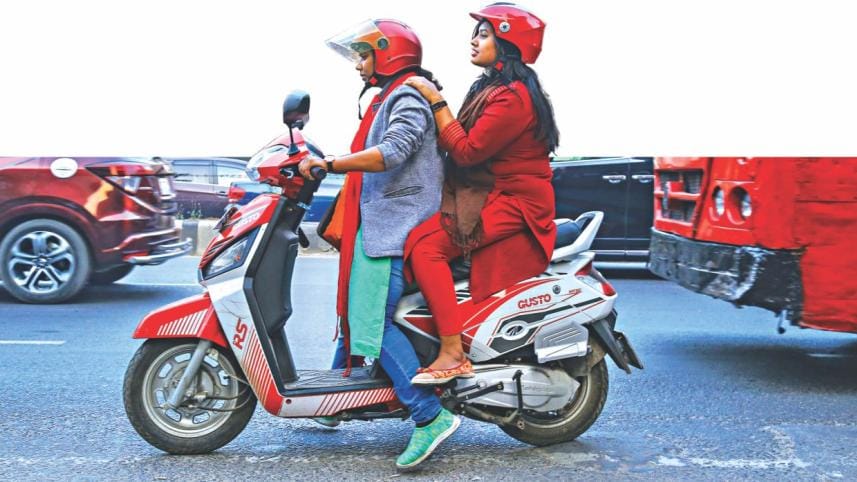Riding in a man's world

Shahanaj Akhter left no stone unturned to earn a livelihood for herself and her two daughters. Her struggle began when her husband refused to take any responsibility of their family. Shahanaj wasn't hopeful she would get a white-collar job, so she started selling food items door to door. The commission she earned doing this was hardly enough to feed her daughters, let alone meet other expenses. Later, she tried her luck in selling life insurance. The job was difficult and people would brush her off.
She didn't lose hope though in the fight to provide for her family. A cousin once proposed that she work with one of the many different ridesharing services. At first, Shahanaj's parents were hesitant but Shahanaj had a passion for riding bikes. She used her lifetime savings (which wasn't much) and took out a loan from one of her relatives to purchase a 'scooti' (scooter). Shahanaj then registered with a few ridesharing apps that are running in Dhaka.
“I always wanted to be financially independent but it wasn't possible with my previous jobs,” she says. Leaving early in the morning and returning late at night, she still had to borrow money from others at the end of the month. “But now, I give time to my family in the morning. I prepare breakfast and tiffin for my daughters and drop them off at school. After all this, I go out with my scooti to ferry around passengers and return at night,” explains Shahnaz. She takes home about 700-800 taka every day—“To me, that's a large amount.”
Shahanaj is not alone in this city. Women are coming onto the streets with their two wheelers and sharing rides with people of all genders. Ridesharing has emerged as a popular source of employment for courageous women like her. Currently, there are around 400 registered riders with the three most popular ridesharing services—Uber, Pathao and Obon. Each of their stories are inspiring as well as unique.
When Razia Sultana Swapna was fired from a private company, she sent résumés to at least a hundred employers by her count. She didn't get a single call back from any of them, though she had completed her bachelor's degree. Shortly after, Razia's father, the only earning member of her family, passed away. With no other way to make ends meet, she put her bike on the road to earning a living. Within a few months, Razia was awarded a new bike from her office for being the best female rider.
Students are also coming forward to join ridesharing apps as it helps them earn some pocket money. Rabeya Bosri, a trainer and a rider from a female-only ride sharing app, just completed her bachelor's degree from a private university. She feels that her job is empowering for young women. “I have always loved riding bikes, so nothing can be better than this job. Though my parents were worried about my safety at first, now they appreciate my position. I feel very happy that I can bear my own expenses and buy them gifts on different occasions,” says Rabeya. “My friends feel happy about me doing this, they say I'm doing something unique.”
How does it feel to ride bikes on the road as a woman? Riding a bike in a city like Dhaka can be daunting as women passengers as well as pedestrians face verbal harassment—catcalling, vulgar words, slangs and more—on a regular basis. “At the beginning, people would look at me as if I was an alien who just had landed from space,” remembers Razia. “I remember one day, while I was waiting at a signal for more than 10 minutes, a middle-aged man was eyeing my body, top to bottom. When the traffic light turned green and he was about to go ahead, I asked, 'Uncle, have you finished looking at me?' The man got very angry and started yelling, 'Aren't you ashamed to ride a bike despite being a girl? And you have the audacity to talk? Shameless woman!'”
The same thing happens to Shahanaj every day. Especially, on her way out, every day, her neighbours gossip, “After doing all the jobs that she could, now here she is riding a bike and that too, without covering her head!”
But, according to the female riders, most of their passengers appreciate their hard work and themselves fight against this abuse. “We don't need to reply, our passengers reply on behalf of us,” says Arifa Sultana, another rider.
Female riders are also a blessing for female commuters, for whom the former mean more than just a safe transportation option. Tilottoma Roy, a regular commuter of a ridesharing service, says she sometimes feels uncomfortable taking a ride with an unknown man. So many times, she has travelled with riders who ask personal questions that make her uncomfortable. “They ask me whether I'm married or have babies, where I work, whether I have a boyfriend, who do I live with and what not,” says Tilottoma. “When I take a ride with a female rider, I don't need to be worried about such questions. Rather, it gives me the courage to move safely on the roads and the journey also becomes less irksome,” she adds.
Since there is no mass rapid transit in Dhaka yet and the number of women-only buses is limited, sexual harassment is widespread on public transport. According to a 2017 BRAC survey, 94 percent of women commuting using public transport in Bangladesh experience some form of sexual harassment. Female riders, to some extent, can make the life of the female commuters easier, while also changing the way our society views women.




 For all latest news, follow The Daily Star's Google News channel.
For all latest news, follow The Daily Star's Google News channel.
Comments